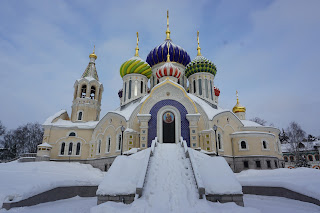Another weekend,
another day trip. There is always another area to explore in this
country and Moscow is surrounded by heaps of small towns with one or
two sights. Peredelkino isn't mentioned in my guidebook, (if the
guidebook mentioned every little place with one or two sights it
would be several volumes, not just one,) we found it on Instagram,
because of a photogenic church.
Peredelkino was
originally a really big estate, owned by the Leontievs. Wikipedia
tells me they were were relatives of Peter the Great.
In the 1930s
the estate was 'given' over (suggested by Maxim Gorky,) to the Soviet Union, and was made into an
area with cottages for people the government wanted to support.
As usual, Claire
and I met on a metro platform, then found a commuter train station.
We hopped the next elektrichka heading toward Peredelkino. The
'station' at Peredelkino was tiny, but as long as there is a place to
buy tickets, does it really matter how big it is?
We exited the
station and almost immediately found an outhouse. Obviously it wasn't
a sight of any kind, but I noticed it because the door was open and
some snow/ice had gathered inside. I couldn't tell who owned it, it was just kind of, there.
Not a fun place to have to use in
this kind of weather.
As we walked toward
the first place we wanted to see, we figured Peredelkino had been
through crazy weather. While there was snow on the ground, and lots
of it, there were also plenty of big, 'scary' icicles.
A nine minute walk
from the train station brought us to the church we'd been hoping to
see. The name didn't mean anything, but it was definitely a newer
style, a modern take on Orthodox church architecture.
We took a team
photo, standing in the thigh deep snow in a field surrounding the
church. While running back and forth from the camera I managed to
drop my phone. Thank goodness I realized it really quickly, and
didn't have too many places to check to find it again.
This church had
coloured tiling around each entry door, of which there were four;
there were also decorative tiles around each of the doors. So many
things of which to take photos. Of those four doors, only one was
actually open for entry. We went inside, but a service was taking
place, so we were only in there for a minute or two.
After exiting we
found the walls of a monastery about ten meters away. The walls were
painted, a dark red colour. We found an open gate and walked in, it
was really quiet. There was no one else around, and there weren't any
other open doors. This wasn't a huge surprise, as the buildings
looked to be housing. Nevertheless, we walked all the way around the
grounds. It was fun to see the piles of snow in various places. Some
of the benches would've been really picturesque if not covered in
snow. They were picturesque as was, just not okay for sitting on at that point.
After exiting the
monastery we went back to the church, which was mostly empty at this
point. I loved the interior, and the ceiling felt more space agey
than other churches we've seen.
Not too far from
the church was a graveyard. We tried to go in, or at least we thought
about it, but after following several streets we couldn't get to
where we wanted to go, which was the grave of Boris Pasternak. (The
Soviet writer who authored Dr. Zhivago.) We decided if we ever come
back to Peredelkino we will come in non snowy weather.
After that we
walked on the main road for a bit, managing to avoid getting run over
by crazy drivers. Eventually we turned off, and got to our second and
final sight of the day: the dacha in which Boris Pasternak lived as a
government supported writer of the Soviet Union.
Pasternak's most
famous publication was the story of Dr. Zhivago, though it was
rejected for publication in the Soviet Union. Ironically, it was this
story for which Pasternak won the Nobel Prize for Literature. Not
surprisingly, the government was quite angry about the award, and he
wasn't allowed to receive the award; he actually had to decline it.
The entry fee for
visiting the dacha was only 150 rubles, quite cheap. We were able to
wander through the house as we wanted, we were also given a set of
papers with information about each room we saw.
The windows were
fantastic. Not only was the dacha pretty big, the rooms felt quite
airy. Part of the reason was because there were so many big windows
that let in heaps of natural light. I'd love to live in a place that
had so much natural light. He slept in a single bed that didn't look
very comfortable. (Then again, any furniture I've seen from the first half of the 20th century has never looked comfortable.)
The bookcases held
some of the other things he wrote, some of the supplies he used, a
set of encyclopedias, and copies of Dr. Zhivago in various languages.
On the bottom floor was the room in which he died, which seemed a bit
morbid to me.
After seeing the
house we walked back to the train station, we didn't have to wait
long for the next train back to central Moscow, yahoo!!
Day trips are
awesome.









No comments:
Post a Comment